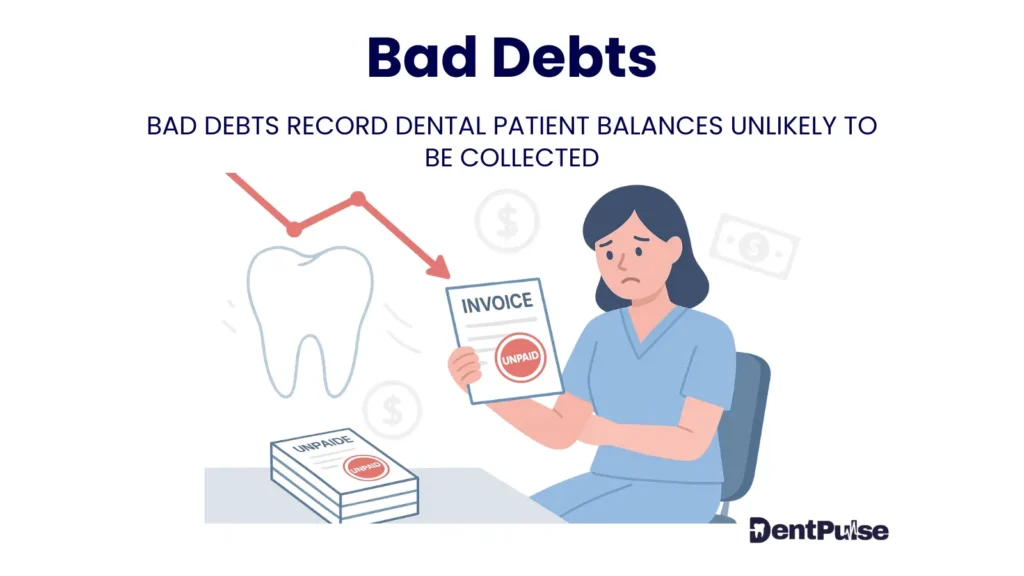What Are Bad Debts in Dental Practices?
Bad Debts refer to treatment fees your dental practice has earned but is unlikely to ever collect — typically due to patient non-payment, failed finance plans, or disputed invoices.
Once classified as a bad debt, the amount is written off from accounts receivable and treated as a loss in the profit and loss statement.
Why Bad Debts Matter for Dental Practice Owners
Every pound of uncollected income is not just lost revenue — it’s also lost profit.
Worse, bad debts can distort your financial clarity if they remain hidden in your AR balance, inflating your expected income and masking liquidity risks.
Example:
If you’ve billed £4,800 for aligners and only received £1,200 — but the patient defaults or cancels — your remaining £3,600 isn’t just delayed… it’s gone.
Unless written off correctly, it will falsely boost your profitability on paper while draining cash flow.
What Causes Bad Debts in Dental Clinics?
| Source | Description |
| Failed Direct Debits | Patient payment plans that bounce or get cancelled |
| NHS Clawbacks | Overclaimed UDAs later reversed or challenged |
| Finance Defaults | Third-party loans rejected or withdrawn mid-treatment |
| Uncollected Deposits | No-shows or cancellations without refund policies |
| Patient Disputes | Treatment dissatisfaction or refund demands after delivery |
Bad debts often emerge from weak credit controls, unclear payment terms, or over-reliance on “production-first” thinking.
How DentPulse Tracks and Flags Bad Debts Automatically
| Feature | Function |
| AR Integrity Engine | Flags overdue receivables likely to default (60+ days risk index) |
| Failed Payment Monitor | Tracks bounced direct debits or rejected finance disbursements |
| CFFP™ Overlay | Adjusts future cash flow forecasts to remove high-risk receivables |
| PPBT™ Impact View | Shows how bad debt write-offs reduce true take-home potential |
| NHS Clawback Alerts | Tags UDA clawbacks before they distort AR or net profit |
DentPulse doesn’t just track what’s earned — it also protects you from believing cash is coming when it isn’t.
DentPulse Tip™
Hope is not a cash flow strategy. Writing off bad debts early protects your forecasts, your team morale, and your financial truth.
DentPulse alerts you when overdue accounts are likely unrecoverable — and adjusts both profit and tax projections instantly.
Related Glossary Terms
- Accounts Receivable (AR) – Income earned but not yet received
- CFFP™ – Cash Flow Future Pairing – Matches expected inflows with outflows
- PPBT™ – Personal Profit Before Tax – Net profit after accounting for actual cash position
- Write-Off Policy – Internal process for recognising bad debts
- AR Ageing Report – Tracks how long receivables have remained unpaid
Glossary Summary Table
| Term | Meaning |
| Bad Debts | Unpaid treatment revenue that is unlikely to be recovered |
| Common Causes | Failed plans, clawbacks, disputes, non-payment |
| Financial Role | Reduces profit, inflates AR, and distorts forecasts if untracked |
| DentPulse Advantage | Automatically flags, writes off, and adjusts projections for bad debt exposure |




